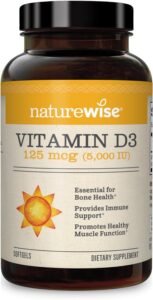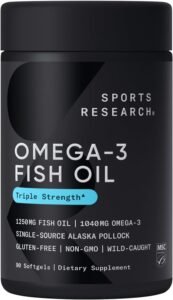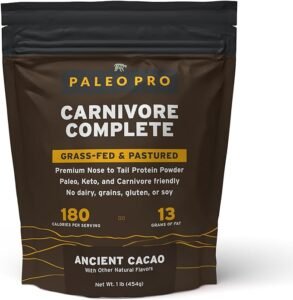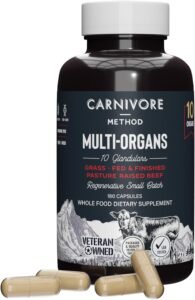
While the carnivore diet emphasizes whole animal products, some individuals may consider supplements to ensure adequate nutrient intake, particularly for vitamins like C and D, and minerals like magnesium. Consulting with a healthcare provider can help determine if supplementation is necessary for optimal health on this diet.
The carnivore diet, known for its focus on animal-based foods, claims numerous health benefits, ranging from weight loss to improved mental clarity. While the diet emphasizes eating meat, some proponents suggest incorporating supplements to ensure nutritional adequacy. We will explore the advantages and disadvantages of using supplements on a carnivore diet, provide suggestions for beginners, and discuss the importance of natural versus synthetic supplements.
Understanding the Carnivore Diet
The carnivore diet primarily consists of meat, fish, and other animal products like eggs and certain dairy items. This diet eliminates all plant-based foods, including fruits, vegetables, grains, and legumes. Proponents argue that the diet closely mimics the eating patterns of early humans and can lead to improved health outcomes.
The Need for Supplements on a Carnivore Diet
Despite the nutritional density of animal-based foods, certain nutrients may be lacking in a strict carnivore diet. Supplements can help bridge this gap, ensuring that followers of the diet receive a well-rounded nutrient profile. However, it’s crucial to understand both the benefits and potential drawbacks of using supplements.
Benefits of Carnivore Supplements
1. Addressing Nutritional Gaps
While meat is rich in many essential nutrients, it may lack others that are typically found in plant-based foods. Supplements can help fill these gaps, providing a more balanced nutrient intake.
- Vitamin C: Meat contains minimal vitamin C, an essential nutrient for collagen synthesis, antioxidant protection, and immune function. While some argue that the body’s requirement for vitamin C decreases on a low-carb diet, supplementation can still be beneficial.
- Magnesium: This mineral is vital for muscle function, nerve signaling, and energy production. Meat alone may not provide adequate magnesium, making supplementation necessary.
- Fiber: Although not traditionally considered a “nutrient,” fiber plays a crucial role in digestive health. Some carnivore dieters use supplements like psyllium husk to ensure regular bowel movements.
2. Enhanced Performance and Recovery
Certain supplements can enhance physical performance and recovery, which is especially beneficial for active individuals on a carnivore diet.
- Creatine: Found naturally in meat, creatine can boost muscle strength, endurance, and recovery when taken as a supplement.
- Electrolytes: Sodium, potassium, and magnesium supplements can help maintain electrolyte balance, preventing dehydration and muscle cramps, particularly during the initial transition phase of the carnivore diet.
3. Supporting Overall Health
Supplements can also support overall health and well-being, addressing specific needs that may arise from a restrictive diet.
- Omega-3 Fatty Acids: While fatty fish are a good source, some individuals may require additional omega-3 supplementation to support heart health, reduce inflammation, and improve brain function.
- Vitamin D: Although the body can synthesize vitamin D from sunlight, many people do not get enough exposure, especially during the winter months. Supplementation can help maintain optimal levels of bone health and immune function.
Drawbacks of Carnivore Supplements
1. Over-reliance on Supplements
Relying too heavily on supplements can detract from the dietary principles of the carnivore diet, which emphasizes whole, unprocessed animal foods. Over-reliance may lead to neglecting the nutrient density of these foods.
2. Potential Side Effects
Supplements, particularly in high doses, can cause side effects or interact with other medications. For example, excessive vitamin D can lead to toxicity, and high doses of magnesium can cause gastrointestinal distress.
3. Cost
Supplements can be expensive, adding to the overall cost of following a carnivore diet. This can be a barrier for some individuals who are already investing in high-quality animal products.
Recommendations for Beginners
For those new to the carnivore diet, navigating the world of supplements can be daunting. Here are some practical recommendations to help you get started:
1. Prioritize Whole Foods
Focus on consuming a variety of nutrient-dense animal products, including different cuts of meat, organ meats, fatty fish, eggs, and dairy (if tolerated). These foods provide a broad spectrum of essential nutrients.
2. Start with Basic Supplements
Begin with a few key supplements to address common deficiencies:
- Electrolytes: Maintain proper hydration and prevent electrolyte imbalances, especially during the initial transition phase.
- Omega-3 Fatty Acids: Consider a high-quality fish oil supplement if your diet lacks fatty fish.
- Vitamin D: Supplement if you have limited sun exposure or live in a region with long winters.
3. Monitor and Adjust
Regularly monitor your health and adjust your supplement regimen as needed. Blood tests can help identify specific deficiencies and guide supplementation.
Natural vs. Synthetic Supplements
When choosing supplements, it’s essential to understand the differences between natural and synthetic options.
Natural Supplements
Natural supplements are derived from whole food sources and typically undergo minimal processing. They are often considered to be more bioavailable and better absorbed by the body.
- Advantages: Natural supplements may contain additional beneficial compounds and nutrients that work synergistically with the primary ingredient.
- Disadvantages: They can be more expensive and less concentrated than synthetic options.
Daddy’s Picks
Synthetic Supplements
Synthetic supplements are manufactured through chemical processes and are designed to mimic the structure of natural nutrients.
- Advantages: Synthetic supplements are often more affordable and provide higher concentrations of specific nutrients.
- Disadvantages: They may lack the additional beneficial compounds found in natural sources and can sometimes be less bioavailable.
Daddy’s Picks

An essential Vitamin: Vitamin D is an essential nutrient for healthy bones, teeth, muscle function, and immune system support. The Mayo Clinic estimates that 25%-50% of the general population may be Vitamin D deficient.

Always Fresh, Never Fishy: We strive to deliver exceptional quality – that means a fish oil supplement without the aftertaste or fish burps that often follow low-quality fish oil capsules. Our Omega-3 oil is extracted, with minimal heat exposure, through a 10-step refinement process that removes fishy odors and impurities.
Suggested Supplements for a Carnivore Diet
Here are some specific recommendations for supplements that can support a carnivore diet:
- Electrolyte Powders: Look for a balanced blend of sodium, potassium, and magnesium to maintain hydration and prevent muscle cramps.
- Fish Oil: Choose a high-quality fish oil supplement with a high concentration of EPA and DHA to support heart and brain health.
- Vitamin D3: Opt for a vitamin D3 supplement with added K2 to enhance absorption and support bone health.
- Magnesium Glycinate: This form of magnesium is well-absorbed and gentle on the digestive system, supporting muscle function and relaxation.
- Vitamin C: A liposomal vitamin C supplement can improve absorption and support immune function without the gastrointestinal discomfort associated with some forms.
Supplements can play a valuable role in a carnivore diet, addressing potential nutritional gaps and supporting overall health and performance. However, it’s essential to prioritize whole, nutrient-dense animal foods and use supplements as a complementary strategy rather than a primary source of nutrition.
For beginners, starting with a few key supplements and gradually adjusting based on individual needs can help ensure a smooth transition to the carnivore diet. Understanding the differences between natural and synthetic supplements can also guide informed choices, ensuring optimal absorption and effectiveness.
Ultimately, the decision to use supplements on a carnivore diet is personal and should be based on individual health goals, preferences, and specific nutritional needs. By taking a thoughtful and balanced approach, you can harness the benefits of both a carnivore diet and targeted supplementation to achieve optimal health and well-being.
READ MORE
- The “Meat Monk” Routine: A Minimalistic, Monk-Style Daily Schedule Built Around Beef and Meditation
- Junk Food Jailbreak: Carnivore Keys to Freedom
- Pregnancy and the Carnivore Diet: Is It a Good Idea?
- When Is It Time to Stop Listening to Carnivore Influencers?
- Why the Carnivore Diet Differs From Location to Location: Why There Is No One-Size-Fits-All Rule
Exclusive Offer

